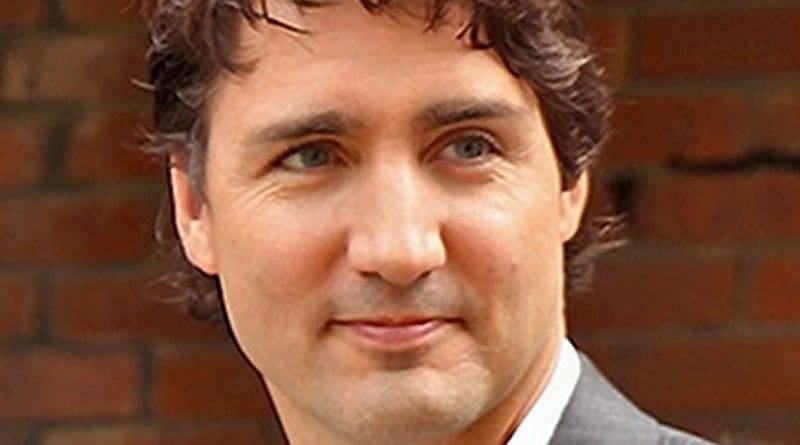Canada And War On Terror: Imperialistic Notions Of Trudeau’s Failed ‘Feminist Foreign Policy’ – OpEd
By Geopolitical Monitor and Scott N. Romaniuk
By Sarah Clifford & Scott N. Romaniuk
Canadian Prime Minister Justin Trudeau was not in office when Canada pulled its troops from Afghanistan in March 2014, but its effects emanate throughout his administration’s policies. With the upcoming federal election and Trudeau’s renewed feminist strategy, now is an ideal time to revisit his most praised and criticized policies to evaluate their success, while keeping in mind their historical relevancy to one of Canada’s most dramatic military engagements: the UN-sanctioned invasion of Afghanistan as part of the broader ‘War on Terror.’
Throughout his first term, Trudeau implemented programs such as the Canadian Fund for Local Initiatives in Iraq, Canada’s Feminist International Assistance Policy and is a key participant in the UN’s 16 Days of Activism. These policies champion, among others, ‘gender equality and the empowerment of women and girls,’ while drawing attention to the need to end gendered violence. Yet, under the guise of Trudeau’s feminist policies, his aid programs have lacked both precision guidelines for their implementation as well as concrete understandings of their implicit consequences as the policies do not pay attention to their imperialistic and thus, racialized notions with which they are saturated.
With its promise of funding for nations such as Afghanistan, the Trudeau government has perpetuated a system of domination and patriarchy by determining which countries are aid recipients. The Canadian state allocates aid to an organization whose policies and practices it approves of. As such, by forcing organizations to follow Canadian guidelines as to how they spend their money, the state becomes the funder and controller, while those receiving aid become the controlled. The loss of Afghan autonomy due to Canadian involvement and moreover, Western domination, showcases the uneven power dynamic between the Western ‘provider’ and the Middle Eastern ‘recipient.’ This has resulted in Canadian aid projects not succeeding in their intended purpose of ‘liberating’ the Afghani people from oppression.
Melanie Butler addresses how the federal government’s ‘feminist’ policies also lack self-awareness in their construction of the ‘other’ by unconsciously identifying women of non-European descent, specifically Muslim women, as the oppressed who need to be saved from their potentially controlling and violent male counterparts. This notion, reminiscent of the justifications behind Canada’s involvement in the War on Terror through the ‘emancipation’ of oppressed Afghani women, points to Canada’s inability to acknowledge its racialized policies, and thus, perpetuates the Canadian state’s patriarchal inclinations and its role as the colonizer.
Why does Trudeau’s failed feminist platform matter for Canadians?
Canada’s imperialistic and white savior complex is not only evident within its past and current aid projects abroad, but also domestically. Recently in Alberta, an upsurge of odious anti-Muslim discourse and actions have sparked confusion over their origins and the lack of policies in place to mitigate them. When analyzing this newfound issue of radicalization, both the Albertan and Canadian governments failed to acknowledge radicalization’s intrinsic connection to the legacy of the ‘War on Terror,’ demonstrating the state’s inability to address the relationship between race and gender in its ‘feminist’ policies.
Through the lack of acknowledgement toward those deemed a ‘threat’ to Canadian society, often associated with those of Middle Eastern descent, and those who are ‘threatened’, often characterized as the ‘dominant’ white class of Canadians, Canada effectively constructed an ‘us’ versus ‘them’ system that: (1) subjugates those seen as outside the ‘superior’ racial class, and (2) establishes a desire for Canadian to ‘save’ those belonging to a supposed ‘inferior’ class. By reasserting the belief that vulnerable and helpless Afghan and Muslim women need saving by non-Muslims, Canada cemented both gender norms and a racial hierarchy within society that has led to an increase in hate crimes and a heightened fear of radicalization.
Even with an increased focus on combating radicalization, such as a $4 million Federal grant given to the Albertan government in 2018, the systemic issues of the War on Terror will not be adequately or effectively addressed. By stumbling forward unaware of the intrinsic relationship between gender and race, Canada has become deeply complicit in the promotion of radicalization. Therefore, aid packages of any magnitude, and further, Canada’s feminist policies are unlikely to ameliorate the problem – immobilizing Trudeau’s feminist agenda and Canada’s aid projects.
The views expressed in this article are those of the author alone and do not necessarily reflect Geopoliticalmonitor.com or any institutions with which the author is associated.


Perhaps Canadians are getting tired of “Saving the World”, in “Woke” speak.